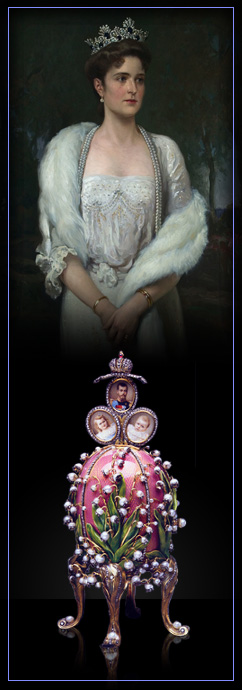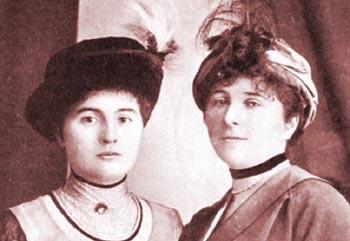Timothy Corrigan, a Pallasart client, is one of the most celebrated interior designers in the world. He has offices in Beverly Hills and Paris.


 PrefacePreface to the book Thy people shall be my people and thy God my God: Where thou diest, will I die, and there will I be buried - RUTH I. 16, 17.
In this biography I have tried to be impartial. I had the privilege of knowing the Empress Alexandra Feodorovna well. I knew her good qualities and her weaknesses. I watched her untiring labour for her country and her family. I saw her in days of joy, and in days when the human soul is stripped of all the conventions that surround the great. I have tried to make this, not the formal biography of a sovereign, but the life of a very human woman, forced by fate to be a heroine of tragedy.  Above: Left, Countess Hendrikov; right, Baroness Sophie Buxhoveden. The Empress's character was very complex. Love for her husband and children was its dominant trait. She was an ideal wife and mother; her worst enemies could not deny her this. She was a very womanly woman, and not always logically reasonable when it was a case of conflict between reason and affection. Her intellect was always subordinate to her heart. In her dealings with other people, her idealism often made her find in them the good that her own nature led her to expect. Her inherent shyness, which she was never able to conquer, was misunderstood and considered pride. She never acquired the easy outward manner and ready smile that win the hearts of the public, and her modesty kept her from fighting for the popularity that she so ardently desired at heart. From her intense love for her only son, who suffered from the terrible hereditary disease of hemophilia, and her anxiety for his health grew her faith in Rasputin, the, the healer. She clung to him as to the last straw that might prove the saving of her child. The Empress's nature had a mystic side-she was descended through the Hessian House (Brabant) from Saint Elizabeth of Hungary and the idea of healing through prayer had for her a strong appeal. It was on this side, and this side only, that Rasputin influenced her. The Empress has been cruelly maligned and grossly wronged. Her want of political experience, her trust in the innate good of humanity, made her commit many political errors. But in everything she did, she was guided solely by her love for the country of her adoption. She came to Russia with high ideals about duty. She believed that the wife of the sovereign is the mother of the country - the "Validé," as the Tartar people called her. She worked incessantly to improve the conditions of the poorer classes, founding schools and hospitals, fighting tenaciously against many difficulties put in her way. All she did in this respect for Russia has never been told and has, since the Revolution, been consistently ignored by all those who have written about her. The Empress adored Russia and the Russian people. No sacrifice could be too great for Russia, even the crown of her husband and her son's inheritance. When she heard of the Emperor's abdication, her only words were "Dieu donne que cela sauve la Russie!" History repeats itself. In a revolution there is always a figure on which the high lights fall and whose every action is liable to misinterpretation. At such times a word may set the ball of calumny rolling; it grows like a snowball, till every evil, every unfortunate act, is ascribed to the one, often innocent, cause. Marie Antoinette, though her character was so different from that of Alexandra Feodorovna, played the same role in the history of the French Revolution. Towards the end the selflessness and spiritual serenity of the Empress grew daily, and are seen in the courage and the nobility with which she bore, without a murmur, the long martyrdom of seventeen months' unceasing humiliation. Her hunger and thirst were for righteousness. At the last, in her Christian submission to the Divine will, she must have found the Truth she sought, and it was the supreme mercy that sent her the fulfilment of the prayer of Ruth and left her with her husband. This book is the record of a life, not the tale of daily happenings at Court. These I may some day tell in my own recollections. This is an exact account of the life of the Empress Alexandra Feodorovna as I know it to have been. May it help to remove false impressions given by people who, at the best, knew her only slightly, and in the future may it assist the sane readjustment of history! I have had the advantage of personal reference to the most authentic sources. The Empress herself, in many conversations, gave me the details I quote about her childhood and youth. I have seen and talked to many people who knew her in Germany and England in her young days. I have been able to read letters, not accessible to the ordinary writer, and have added my own impressions and recollections. From 1913 all the incidents I describe are those in which I myself took part. Previous dates, names, incidents, etc., have been verified by my two former colleagues, the Princess Elizabeth Nicholaevna Obolensky and Princess Marie Victorovna Bariatinsky. I must beg my readers' indulgence for many mistakes. I am a Russian, and write in a language not my own, without any previous literary experience. I have put down the record of events and my ideas about them as they came to me. In some cases I have been obliged to avoid mentioning names, on account of the sad conditions now prevailing in my unhappy country. I owe the deepest gratitude to the relations and friends of the Empress Alexandra Feodorovna for having kindly lent me letters and photographs for publication; also to M. Pierre Gilliard for permission to use some of his photographs and to make quotations from his book 11 Thirteen Years at the Russian Court " (Messrs. Hutchinson). I am indebted for some quotations from the Empress's letters to Mme. Vyroubova's "Memories of the Russian Court" (Messrs. Macmillan) and Mme. Lily Dehn's "The Real Tsaritsa" (Messrs. Butterworth). Also to Dr. Ernst Seraphim's "Die Tragedie der Zarenfamilie" and to M. Paléologue's "An Ambassador's Memoirs" (Messrs. Hutchinson) for some extracts. I am very much obliged to Messrs. Payot et Cie. for authorising me to republish some photographs which have appeared in their publications, and to Frau von Kaulbach for permission to reproduce in these pages a picture of the Empress painted by the late F. A. von Kaulbach. I would like to tender my warmest thanks to Mr. J. C. Squire and Mr. R. Longman for their interest and kind criticism of my work; also to my friend, Miss Kathleen Conyngham Greene, for her constant encouragement and helpful advice, for all of which I am warmly grateful. Lastly, to Miss Grace Chapman, whose valuable suggestions and assistance in proof reading I deeply appreciate. SOPHIE BUXHOEVEDEN |
|
Alexandra Feodorovna was the last Romanov Empress of Imperial Russia. This online book - The Life and Tragedy of Alexandra Feororvna was written by Countess Sophie Buxhoeveden, Lady-in-Waiting to the Empress, who served the Empress for many years and followed the Imperial family into exile. |

- Early Surroundings
- Childhood
- A Young Princess
- Engagement
- Marriage
- Her New Home
- Coronation
- Journeys
- Charities and Life
- Queen Victoria
- Foreign Trips
- Birth of Alexis
- Gathering Clouds
- On the Standart
- Rasputin
- Her Family
- Empress at Home
- Last Years of Peace
- Wartime 1914
- War Work
- Without the Emperor
- Visits to Headquarters
- Before the Storm
- Warning Voices
- Rasputin's Murder
- Revolution 1917
- Abdication of the Emperor
- Prisoners
- Five Weary Months
- Tobolsk
- Ekaterinburg 1918





